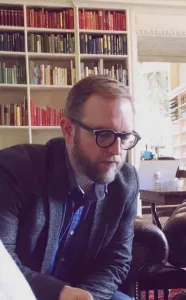
Professor of Digital Humanities, University of Sussex, UK
Research project title:
Critical Theory, Artificial Intelligence and Explainability
Abstract
In this research I plan to explore the implications of explainability for the critical theory, and particularly the concept of explainability it gives rise to. This is increasingly relevant to the growing public visibility of artificial intelligence and machine-learning projects and the potential for the application of machine learning drawn from these approaches. This is an extremely difficult requirement for computational systems to achieve. By situating the questions over explainability in terms of theories and concepts drawn from critical theory, such as notions of instrumental rationality, the dialectic of enlightenment, standardization and related problems of the political economy and commodity fetishism will create an extremely deep set of philosophical and theoretical questions. For example, the question of interpretation is hugely simplified in the proposals over explainability, the question of an interpreting subject, its capacities and its relation to assumed notions of truth are also suggestive. This research explores how power and life chances are redistributed where cognitive capacities themselves are subject to the market and therefore unequally available to the public. I therefore propose to explore explainability as a normative justification and as a technical project in light of these questions, and extend the debate over explainability into questions of interpretation through a notion of “understandability”. That is, to understand how justifications from the domains of a formal, technical and causal models of explanation have replaced that of understanding and thereby give rise to tensions and social conflict. The aim is to situate the current debates over explainability within a historical constellation of concepts but also to provide an immanent critique of the claims and justifications of “smart” technologies that build on artificial and machine-learning techniques, particularly in light of their impacts on cognitive proletarianization, political economy and what we might call the structural transformation of the informational and cognitive capacity of societies under conditions of digital technicity.
Events:
November 7, 2019, 6pmLecture
Artificial Intelligence, Explainability and Critical Theory
-
Biografische Angaben
Professor David M. Berry researches the theoretical and medium-specific challenges of understanding digital and computational media, particularly algorithms, software and code. His work draws on digital humanities, critical theory, political economy, social theory, software studies, and the philosophy of technology. As Professor of Digital Humanities, he is interested in how computation is being incorporated into arts and humanities and social science practice. In relation to this he is currently exploring how artificial intelligence and machine-learning are articulated in relation to arts and humanities knowledges - particularly notions of augmenting, automating and informing. More particularly, he is interested in how knowledge, organization and computation are formed into new constellations of power. This work examines how these systems are legitimated and the orders of justification around them together with the potential of concepts such as explainability for providing immanent critique and the space for practices of critical reason. -
Publikationen
Berry, David M and Fagerjord, Anders (2017) Digital humanities: knowledge and critique in a digital age. Polity Press, Cambridge. ISBN 9780745697659 Berry, David M (2014) Critical theory and the digital. Critical theory and contemporary society. Bloomsbury, New York. ISBN 9781441166395 Berry, David M (2011) The philosophy of software: code and mediation in the digital age. Palgrave Macmillan, Basingstoke. ISBN 9780230244184 Berry, David M (2008) Copy, rip, burn: the politics of copyleft and open source. Pluto Press, London. ISBN 9780745324159

